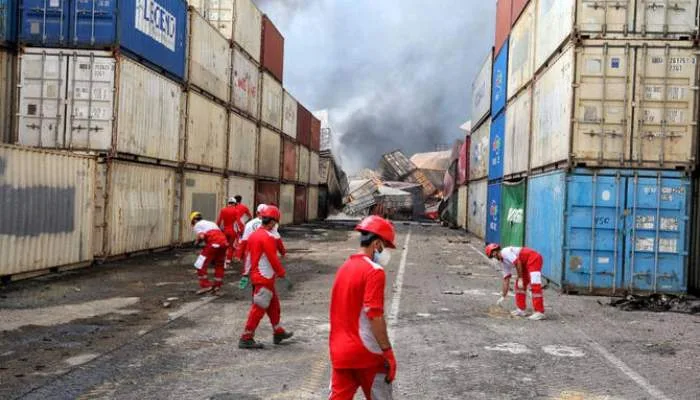TEHRAN – Iran’s interior minister has squarely blamed “negligence” for the devastating explosion at Shahid Rajaee Port, the nation’s largest commercial hub, leaving at least 70 dead and over 1,000 injured.
Firefighters continued battling the blaze on Monday, two days after the powerful blast shook the southern port near the vital Strait of Hormuz.
Interior Minister Points to Negligence
Interior Minister Eskandar Momeni, speaking to state TV, confirmed that investigators had identified and summoned the culprits. “The blast resulted from serious shortcomings, including noncompliance with safety standards and clear negligence,” he said. Momeni, who rushed to the scene hours after the explosion, added that investigations are ongoing.
Rising Death Toll and Desperate Firefighting Efforts
Hormozgan Province Governor Mohammad Ashouri updated the public, stating, “Unfortunately, the death toll has reached 70.” Firefighters, he said, were in the “final stages” of extinguishing the massive fire.
Mehrdad Hassanzadeh, head of crisis management for Hormozgan, confirmed that most of the more than 1,000 injured had been treated and discharged. However, thick, black smoke continued to rise over smoldering flames, with helicopters circling overhead, footage from the Iranian Red Crescent showed.
What Sparked the Disaster?
Authorities suspect the explosion began in a hazardous materials storage depot. CCTV footage circulating online shows a small fire belching orange-brown smoke among stacked containers. Within minutes, a violent fireball erupted, forcing nearby workers to flee.
Iran’s customs office pointed to the initial blaze involving chemical materials as the probable cause. Meanwhile, Ayatollah Ali Khamenei has ordered a full probe into the incident.
Read: SBP Highlights Sharp Economic Recovery in H1-FY25
International Assistance and Warnings
Russia, a key Iranian ally, has sent firefighting specialists to assist in controlling the disaster.
Authorities closed all schools and offices in the area and advised residents to stay indoors and wear protective masks due to toxic fumes.
President Masoud Pezeshkian visited the wounded in Bandar Abbas hospitals on Sunday, emphasizing government support for victims and their families.
A national day of mourning was declared for Monday, with Hormozgan province observing three days of mourning starting Sunday.
Possible Links to Broader Tensions
Though officials maintain the blast appears accidental, the timing has raised eyebrows. The explosion occurred just as Iranian and US officials held high-level nuclear talks in Oman.
The New York Times, citing a source linked to Iran’s Revolutionary Guard, reported that sodium perchlorate—a compound used in missile fuel—may have triggered the explosion. However, Defence Ministry spokesman Reza Talaei-Nik dismissed claims of military cargo involvement, asserting, “No military fuel imports or exports occurred in this area.”
Notably, in 2020, The Washington Post reported an alleged Israeli cyberattack targeting the very same Shahid Rajaee Port, deepening suspicions.
Follow us on Google News, Instagram, YouTube, Facebook, Whats App, and TikTok for latest updates
